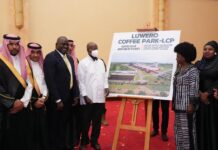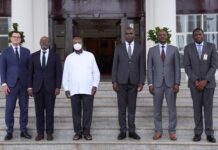By URN
Over 7,500 farmers and learners in Buliisa and surrounding districts are already benefiting from a solar-powered irrigation scheme launched by TotalEnergies Uganda under the Tilenga Project’s Community Agriculture Initiative (CAI). The initiative, which targets over 10,000 farmers from Buliisa, Hoima, Kikuube, Pakwach, and Nwoya districts, is designed to boost agricultural productivity, improve food security, and enhance livelihoods.
Harriet Katusiime, a farmer from Ndandamire village who has benefited from the demonstration garden established under the project, says most women have been empowered and equipped with knowledge to practice modern farming methods. “Tukusiima Total na…kinane na mibiri,” she said, adding that this has greatly improved their livelihoods and income since they have applied the knowledge acquired on their own farms.
She appealed to the government to establish more irrigation schemes in the district to help farmers enhance agricultural productivity and food security. Robert Byaruhanga, headteacher at Ndandamire Primary School, says the project has boosted the school’s feeding initiative by providing food to learners, which has resulted in increased enrollment and improved academic performance.
The solar-powered irrigation scheme has been established at Ndandamira Primary School in Kigwera sub-county after the school availed two acres of land for the initiative. The system includes a 30,000-litre water reservoir, solar pump, drip and LaserJet irrigation lines, multiple handwashing stations, and two public standpipes from which the school and community can access clean, safe water.
Under the initiative, TotalEnergies has partnered with Community Integrated Development Initiative (CIDI) to establish a demonstration garden at Ndandamire Primary School, where local communities are trained on modern farming techniques.
Daphine Natukunda, Social Package Manager at TotalEnergies, explains that the use of easily operated small solar pumps, piping to a header tank, and a gravity distribution system is expected to reduce labor, increase food security among schools and communities, and increase vegetable production, especially during the dry season.
She adds that currently 7,500 farmers have been reached and trained as direct beneficiaries, while 10 demonstration farms covering a total of 40 acres have been established at schools in different districts. The initiative has also seen 40 demonstration farms of one acre each established at the community level, which are fully operational.
“Farmers around these demonstration farms have been organized into groups, trained in best agronomic and climate-resilient practices, and are applying these techniques on their own farms. The project has also provided improved inputs and materials to boost yields of cassava, groundnuts, beans, maize, vegetables, and apiary enterprises,” said Natukunda.
Natukunda says the farmer groups have also received post-harvest and value addition support, including equipment to improve storage, processing, and market readiness.
Dr. Fulengensio Juuko, Executive Director of CIDI, says the project will help connect farmers to larger markets, including purchasing their produce (fruits and vegetables) to feed workers at TotalEnergies operational campsites. He adds that they also host agribusiness forums to bridge knowledge gaps and strengthen value chain linkages.
Juuko says that community demonstration farms act as centers of technology transfer, where farmers and learners go to learn techniques of agronomy, pest and disease control, manure application, and soil and water conservation so they can apply the knowledge on their own farms.
He adds that they have started linking farmers to various government financial institutions to offer financial support to improve their farming businesses. Wyclif Katulinde, Buliisa District Production and Marketing Officer, explains that the project is a big boost in enhancing agricultural productivity, food security, and household income by providing reliable water for farming. He says the project aligns with the National Development Plan III.
Buliisa Chief Administrative Officer (CAO) Dr. Levi Musingizi says the irrigation scheme is a lifeline investment to the school and the community, calling it a seed of transformation.
Sylvester Tumukurate, Deputy Resident District Commissioner (RDC), appealed to the school authorities and communities in Buliisa to jealously own and guard the project.



